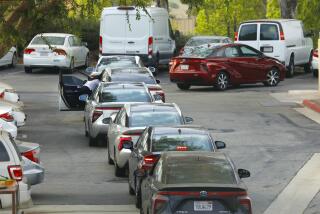Energy priorities must change
- Share via
Re “The Geo Metro as dream machine,” Column One, Sept. 9
So some people are driving 30-year-old cars that get much better gas mileage than today’s automobiles. Such vehicles, because of their scarcity, are unavailable to most of us. What to do then?
Many of us are in the position of owning a gas guzzler that, despite eliciting an ouch on every fill-up, is still too young to be scrapped. Should we sell it, buy a hybrid and get a warm feeling for helping save the planet?
It sounds good at first, but what about the person who buys our big car? He or she will continue, presumably, to drive it, and use as much fuel, or perhaps more, than we did.
Far better to find a good mechanic and keep our big car running as long as possible, thereby helping the local economy, and to change driving habits so we accomplish multiple errands on one trip. We will still say ouch, but less frequently.
Dick Jackson
Arroyo Grande
--
As a former Geo Metro owner and current Toyota Prius driver, I know my situation of 18 years of 40-mpg-or-better mileage is unusual. The fact is, though, that we can do so much better and have just fundamentally lacked the will to change.
In the 1920s, there were experimental cars with hybrid and compressed-air technologies, although they were primitive and not commercially viable. Even the Ford Model T averaged about 25 mpg. Yet here we are, 80 years later, and we’ve made little progress in moving away from the use of the internal combustion engine. Not even the wake-up call of the 1970s energy crisis could scare the country into making meaningful headway.
Now an even greater urgency is upon us, but the majority’s hue and cry is to drill for more oil offshore and in Alaska. Why a country that so often demonstrates amazing technological prowess remains unable to muster the support needed for transformative change is mystifying.
Tellingly, a 1925 issue of the Los Angeles-based industry publication, “The Oil Age,” included a short article on why European cars were so much more fuel efficient than domestic ones. The reason? We Americans placed our priority on power.
GM program engineer Al Manzor’s comment that cars that don’t race to 60 mph in seven seconds or less are not competitive reveals just how little our priorities have changed. The crux now is that, long term, we don’t have the luxury of deferring hard choices.
Paul R. Spitzzeri
Chino Hills






